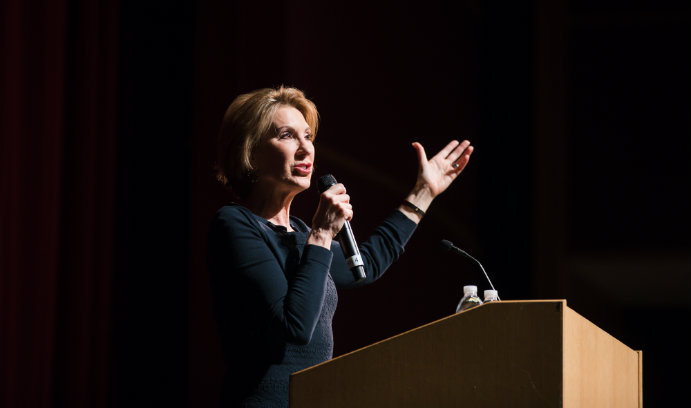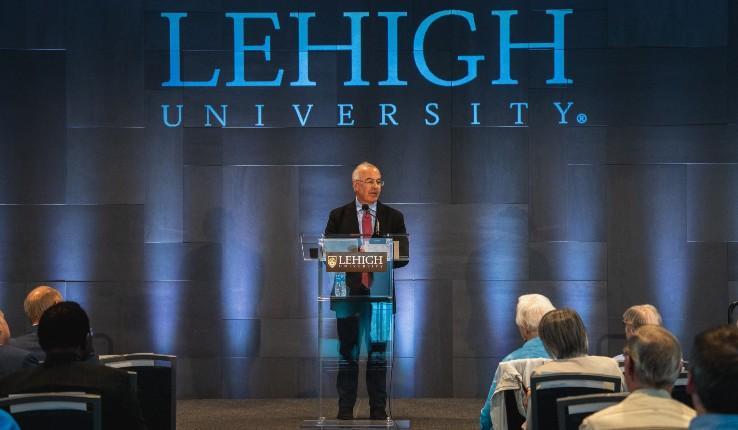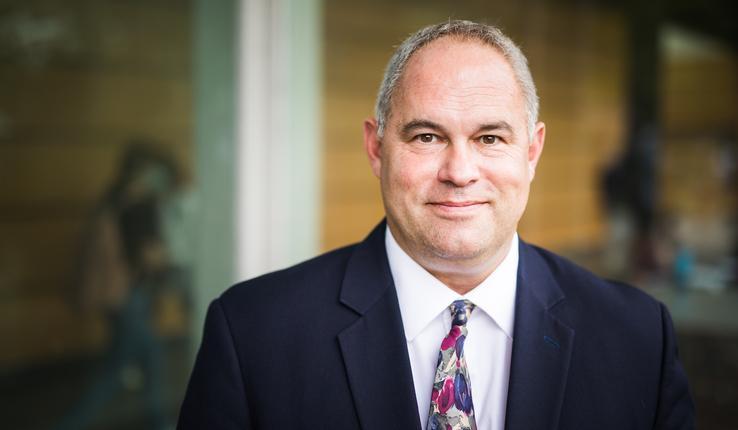Carly Fiorina: On Leadership and Ethics

Former Hewlett-Packard CEO and 2016 Republican presidential candidate Carly Fiorina delivers the inaugural Peter S. Hagerman ‘61 Lecture in Ethics. Photo: Christa Neu
Former Hewlett-Packard CEO and 2016 Republican presidential candidate Carly Fiorina had stories to tell Tuesday night—about people overlooked and underestimated, and who rose up to new challenges—as she delivered Lehigh’s inaugural Peter S. Hagerman ‘61 Lecture in Ethics.
“What I’ve learned over and over and over again,” she told the audience in Baker Hall on March 27, “is that everybody has more potential than they realize and that most of us, all of us probably, need somebody to take a chance on us. Most of us, all of us, need somebody at some point to say, ‘I see possibilities in you,’ to give us a helping hand, to give us a chance, maybe a second chance, maybe a third chance. But all of us have more potential than we realize.”
In a 90-minute forum that ended with a standing ovation, Fiorina talked about character, ethics and leadership, about lessons she’s learned in her business and political careers, about her professional climb from agency temp to first female chief executive of a major technology company to her presidential run. She talked too about the nation’s founding ideals.
“What the Constitution says is that the individual is sovereign,” she said. “That was a radical idea. Not a king, not a government, not a president, not a Congress. The individual is sovereign. My way of saying it is that everybody has more potential than they realize. The Constitution’s way of saying it [is], everyone has the right to life, liberty and the pursuit of happiness.”
A core ideal, she said, is that people should not be defined by their circumstances, appearance or parentage. “We’re defined by what’s inside and what we do with it,” she said. ”We are defined by our contribution.”
Fiorina’s address on “Why Ethics and Respect Matter” helped launch Lehigh’s new Center for Ethics, an interdisciplinary endeavor housed in the College of Arts and Sciences and under the direction of Robin S. Dillon, the William Wilson Selfridge Professor of Philosophy at Lehigh.
“Ethics as a dimension of any Lehigh education has become ever more pronounced as society faces crises in the important spheres of life, where Lehigh expects its graduates to work and assume leadership roles,” said Dean Donald E. Hall, who introduced Fiorina.
“Our center seeks to address the need to develop educated citizens, both aware of moral complexity and committed to advancing the common good, individuals who have learned to assess information and attend to sound ethical values in achieving understanding, who are civic-minded and capable of civil discourse even when value conflicts arise and whose personal code of values and ethics emphasize a need to accept responsibility for themselves as well as for the well-being of their various communities.”
Hall said Fiorina, as a tested corporate and community leader with decades of experience, was the perfect fit for the opening lecture.
Fiorina began her talk by telling her life story: that she grew up shy and eager to please, that she studied medieval history as an undergraduate, that she went on to law school but quit because she didn’t like it. After that, she took a job as a secretary in a nine-person real estate office, and after six months, she was approached by two men in the office who said they saw potential in her and offered her more responsibilities.
“I’m not quite sure how my life would have gone if those two men didn’t see possibilities in me,” she told the audience. “But it is a lesson I have remembered all my life. Because they saw possibilities in me, I saw possibilities in myself.”
Fiorina said she met other people throughout her career who, when given opportunity and recognized for their potential, went on to excel at their jobs. In addition, she said, she learned that people impacted by a problem can figure out how to solve it, that concentrated power in a bureaucracy can lead to abuses and that problems won’t get solved unless someone is willing to challenge the status quo.
“Someone has to be willing to say, ‘I don’t accept the way things are,’” said Fiorina. And that’s where leadership figures in, she said. “Leadership is not about position or title. Leadership is about solving problems…. A leader has to challenge the status quo in order to solve problems.”
Inevitably, criticism will follow, she said, which means that leadership also requires courage and character. “It requires knowing, ’what do I think is right or wrong?’...Not everybody is going to agree on those things, but you have to know the difference between a popularity contest and actually making progress. You have to know the difference between reaching out to an individual because they have quality and potential and something to contribute, versus reaching out to [individuals] because they're popular or wealthy or whatever makes them a success in the status quo.”
Also, she said, it takes character to understand that how things get done is as important as what gets done. “When you speak disrespectfully to other people, you don't achieve as much,” she said. “You don't pull a team together.”
Fiorina also spoke about humility and empathy, which she said are important in collaboration.
“You can act by yourself all the time, but you're not going to get much done. You need to collaborate with others. And in particular most of the time you need to collaborate with people who are different than you because we are surrounded by people different than us.”
Fiorina said every era and culture recognizes a difference between right and wrong. While that may be defined differently, she said, people always conclude that what’s right and wrong is not necessarily defined by popular culture.
“It's a matter of conscience, not what the popular culture says at the time. ... So often the people who are celebrated as ethical and good people after the fact were criticized mightily in their times,” she said. “Interesting, isn’t it, that you can’t necessarily look out to the headlines of the moment to figure out the difference between good and bad, right and wrong, that you have to look inside and think deeply about what you believe.”
In a question-and-answer segment that followed, Fiorina was asked whether she was considering a Republican presidential primary challenge. While she did not rule it out, she said she has no current plan to do so.
Fiorina also was asked about the political vitriol that is polarizing the country. What’s important, she said, is not to be infected by the contagion but “to sit down and have civil conversations among ourselves, even if we disagree on some things, to sit in our communities and talk about how to make it better, to sit [with] our families and talk about how to make it better.
“I’m not saying not to be an engaged citizen and not to vote, not at all….But don’t allow the way politicians talk to become the way we talk. Because remember in this country, although it doesn’t always feel like it...citizens are sovereign.”
Posted on:




